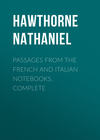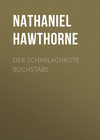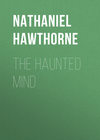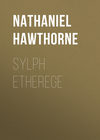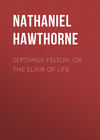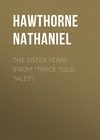Buch lesen: «Passages from the French and Italian Notebooks, Complete», Seite 3
We had a wretched breakfast, and J – and I then went to the railway station to see about our luggage. On our walk back we went astray, passing by a triumphal arch, erected by the Marseillais, in honor of Louis Napoleon; but we inquired our way of old women and soldiers, who were very kind and courteous, – especially the latter, – and were directed aright. We came to a large, oblong, public place, set with trees, but devoid of grass, like all public places in France. In the middle of it was a bronze statue of an ecclesiastical personage, stretching forth his hands in the attitude of addressing the people or of throwing a benediction over them. It was some archbishop, who had distinguished himself by his humanity and devotedness during the plague of 1720. At the moment of our arrival the piazza was quite thronged with people, who seemed to be talking amongst themselves with considerable earnestness, although without any actual excitement. They were smoking cigars; and we judged that they were only loitering here for the sake of the sunshine, having no fires at home, and nothing to do. Some looked like gentlemen, others like peasants; most of them I should have taken for the lazzaroni of this Southern city, – men with cloth caps, like the classic liberty-cap, or with wide-awake hats. There were one or two women of the lower classes, without bonnets, the elder ones with white caps, the younger bareheaded. I have hardly seen a lady in Marseilles; and I suspect, it being a commercial city, and dirty to the last degree, ill-built, narrow-streeted, and sometimes pestilential, there are few or no families of gentility resident here.
Returning to the hotel, we found the rest of the party ready to go out; so we all issued forth in a body, and inquired our way to the telegraph-office, in order to send my message about the carpet-bag. In a street through which we had to pass (and which seemed to be the Exchange, or its precincts), there was a crowd even denser, yes, much denser, than that which we saw in the square of the archbishop's statue; and each man was talking to his neighbor in a vivid, animated way, as if business were very brisk to-day.
At the telegraph-office, we discovered the cause that had brought out these many people. There had been attempts on the Emperor's life, – unsuccessful, as they seem fated to be, though some mischief was done to those near him. I rather think the good people of Marseilles were glad of the attempt, as an item of news and gossip, and did not very greatly care whether it were successful or no. It seemed to have roused their vivacity rather than their interest. The only account I have seen of it was in the brief public despatch from the Syndic (or whatever he be) of Paris to the chief authority of Marseilles, which was printed and posted in various conspicuous places. The only chance of knowing the truth with any fulness of detail would be to come across an English paper. We have had a banner hoisted half-mast in front of our hotel to-day as a token, the head-waiter tells me, of sympathy and sorrow for the General and other persons who were slain by this treasonable attempt.
J – and I now wandered by ourselves along a circular line of quays, having, on one side of us, a thick forest of masts, while, on the other, was a sweep of shops, bookstalls, sailors' restaurants and drinking-houses, fruit-sellers, candy-women, and all manner of open-air dealers and pedlers; little children playing, and jumping the rope, and such a babble and bustle as I never saw or heard before; the sun lying along the whole sweep, very hot, and evidently very grateful to those who basked in it. Whenever I passed into the shade, immediately from too warm I became too cold. The sunshine was like hot air; the shade, like the touch of cold steel, – sharp, hard, yet exhilarating. From the broad street of the quays, narrow, thread-like lanes pierced up between the edifices, calling themselves streets, yet so narrow, that a person in the middle could almost touch the houses on either hand. They ascended steeply, bordered on each side by long, contiguous walls of high houses, and from the time of their first being built, could never have had a gleam of sunshine in them, – always in shadow, always unutterably nasty, and often pestiferous. The nastiness which I saw in Marseilles exceeds my heretofore experience. There is dirt in the hotel, and everywhere else; and it evidently troubles nobody, – no more than if all the people were pigs in a pigsty…
Passing by all this sweep of quays, J – and I ascended to an elevated walk, overlooking the harbor, and far beyond it; for here we had our first view of the Mediterranean, blue as heaven, and bright with sunshine. It was a bay, widening forth into the open deep, and bordered with heights, and bold, picturesque headlands, some of which had either fortresses or convents on them. Several boats and one brig were under sail, making their way towards the port. I have never seen a finer sea-view. Behind the town, there seemed to be a mountainous landscape, imperfectly visible, in consequence of the intervening edifices.
THE MEDITERRANEAN SEA
Steamer Calabrese, January 17th. – If I had remained at Marseilles, I might have found many peculiarities and characteristics of that Southern city to notice; but I fear that these will not be recorded if I leave them till I touch the soil of Italy. Indeed, I doubt whether there be anything really worth recording in the little distinctions between one nation and another; at any rate, after the first novelty is over, new things seem equally commonplace with the old. There is but one little interval when the mind is in such a state that it can catch the fleeting aroma of a new scene. And it is always so much pleasanter to enjoy this delicious newness than to attempt arresting it, that it requires great force of will to insist with one's self upon sitting down to write. I can do nothing with Marseilles, especially here on the Mediterranean, long after nightfall, and when the steamer is pitching in a pretty lively way.
(Later.) – I walked out with J – yesterday morning, and reached the outskirts of the city, whence we could see the bold and picturesque heights that surround Marseilles as with a semicircular wall. They rise into peaks, and the town, being on their lower slope, descends from them towards the sea with a gradual sweep. Adown the streets that descend these declivities come little rivulets, running along over the pavement, close to the sidewalks, as over a pebbly bed; and though they look vastly like kennels, I saw women washing linen in these streams, and others dipping up the water for household purposes. The women appear very much in public at Marseilles. In the squares and places you see half a dozen of them together, sitting in a social circle on the bottoms of upturned baskets, knitting, talking, and enjoying the public sunshine, as if it were their own household fire. Not one in a thousand of them, probably, ever has a household fire for the purpose of keeping themselves warm, but only to do their little cookery; and when there is sunshine they take advantage of it, and in the short season of rain and frost they shrug their shoulders, put on what warm garments they have, and get through the winter somewhat as grasshoppers and butterflies do, – being summer insects like then. This certainly is a very keen and cutting air, sharp as a razor, and I saw ice along the borders of the little rivulets almost at noonday. To be sure, it is midwinter, and yet in the sunshine I found myself uncomfortably warm, but in the shade the air was like the touch of death itself. I do not like the climate.
There are a great number of public places in Marseilles, several of which are adorned with statues or fountains, or triumphal arches or columns, and set out with trees, and otherwise furnished as a kind of drawing-rooms, where the populace may meet together and gossip. I never before heard from human lips anything like this bustle and babble, this thousand-fold talk which you hear all round about you in the crowd of a public square; so entirely different is it from the dulness of a crowd in England, where, as a rule, everybody is silent, and hardly half a dozen monosyllables will come from the lips of a thousand people. In Marseilles, on the contrary, a stream of unbroken talk seems to bubble from the lips of every individual. A great many interesting scenes take place in these squares. From the window of our hotel (which looked into the Place Royale) I saw a juggler displaying his art to a crowd, who stood in a regular square about him, none pretending to press nearer than the prescribed limit. While the juggler wrought his miracles his wife supplied him with his magic materials out of a box; and when the exhibition was over she packed up the white cloth with which his table was covered, together with cups, cards, balls, and whatever else, and they took their departure.
I have been struck with the idle curiosity, and, at the same time, the courtesy and kindness of the populace of Marseilles, and I meant to exemplify it by recording how Miss S – and I attracted their notice, and became the centre of a crowd of at least fifty of them while doing no more remarkable thing than settling with a cab-driver. But really this pitch and swell is getting too bad, and I shall go to bed, as the best chance of keeping myself in an equable state.
ROME
37 Palazzo Larazani, Via Porta Pinciana, January 24th. – We left Marseilles in the Neapolitan steamer Calabrese, as noticed above, a week ago this morning. There was no fault to be found with the steamer, which was very clean and comfortable, contrary to what we had understood beforehand; except for the coolness of the air (and I know not that this was greater than that of the Atlantic in July), our voyage would have been very pleasant; but for myself, I enjoyed nothing, having a cold upon me, or a low fever, or something else that took the light and warmth out of everything.
I went to bed immediately after my last record, and was rocked to sleep pleasantly enough by the billows of the Mediterranean; and, coming on deck about sunrise next morning, found the steamer approaching Genoa. We saw the city, lying at the foot of a range of hills, and stretching a little way up their slopes, the hills sweeping round it in the segment of a circle, and looking like an island rising abruptly out of the sea; for no connection with the mainland was visible on either side. There was snow scattered on their summits and streaking their sides a good way down. They looked bold, and barren, and brown, except where the snow whitened them. The city did not impress me with much expectation of size or splendor. Shortly after coming into the port our whole party landed, and we found ourselves at once in the midst of a crowd of cab-drivers, hotel-runnets, and coin missionaires, who assaulted us with a volley of French, Italian, and broken English, which beat pitilessly about our ears; for really it seemed as if all the dictionaries in the world had been torn to pieces, and blown around us by a hurricane. Such a pother! We took a commissionaire, a respectable-looking man, in a cloak, who said his name was Salvator Rosa; and he engaged to show us whatever was interesting in Genoa.
In the first place, he took us through narrow streets to an old church, the name of which I have forgotten, and, indeed, its peculiar features; but I know that I found it pre-eminently magnificent, – its whole interior being incased in polished marble, of various kinds and colors, its ceiling painted, and its chapels adorned with pictures. However, this church was dazzled out of sight by the Cathedral of San Lorenzo, to which we were afterwards conducted, whose exterior front is covered with alternate slabs of black and white marble, which were brought, either in whole or in part, from Jerusalem. Within, there was a prodigious richness of precious marbles, and a pillar, if I mistake not, from Solomon's Temple; and a picture of the Virgin by St. Luke; and others (rather more intrinsically valuable, I imagine), by old masters, set in superb marble frames, within the arches of the chapels. I used to try to imagine how the English cathedrals must have looked in their primeval glory, before the Reformation, and before the whitewash of Cromwell's time had overlaid their marble pillars; but I never imagined anything at all approaching what my eyes now beheld: this sheen of polished and variegated marble covering every inch of its walls; this glow of brilliant frescos all over the roof, and up within the domes; these beautiful pictures by great masters, painted for the places which they now occupied, and making an actual portion of the edifice; this wealth of silver, gold, and gems, that adorned the shrines of the saints, before which wax candles burned, and were kept burning, I suppose, from year's end to year's end; in short, there is no imagining nor remembering a hundredth part of the rich details. And even the cathedral (though I give it up as indescribable) was nothing at all in comparison with a church to which the commissionaire afterwards led us; a church that had been built four or five hundred years ago, by a pirate, in expiation of his sins, and out of the profit of his rapine. This last edifice, in its interior, absolutely shone with burnished gold, and glowed with pictures; its walls were a quarry of precious stones, so valuable were the marbles out of which they were wrought; its columns and pillars were of inconceivable costliness; its pavement was a mosaic of wonderful beauty, and there were four twisted pillars made out of stalactites. Perhaps the best way to form some dim conception of it is to fancy a little casket, inlaid inside with precious stones, so that there shall not a hair's-breadth be left unprecious-stoned, and then to conceive this little bit of a casket iucreased to the magnitude of a great church, without losing anything of the excessive glory that was compressed into its original small compass, but all its pretty lustre made sublime by the consequent immensity. At any rate, nobody who has not seen a church like this can imagine what a gorgeous religion it was that reared it.
In the cathedral, and in all the churches, we saw priests and many persons kneeling at their devotions; and our Salvator Rosa, whenever we passed a chapel or shrine, failed not to touch the pavement with one knee, crossing himself the while; and once, when a priest was going through some form of devotion, he stopped a few moments to share in it.
He conducted us, too, to the Balbi Palace, the stateliest and most sumptuous residence, but not more so than another which he afterwards showed us, nor perhaps than many others which exist in Genoa, THE SUPERB. The painted ceilings in these palaces are a glorious adornment; the walls of the saloons, incrusted with various-colored marbles, give an idea of splendor which I never gained from anything else. The floors, laid in mosaic, seem too precious to tread upon. In the royal palace, many of the floors were of various woods, inlaid by an English artist, and they looked like a magnification of some exquisite piece of Tunbridge ware; but, in all respects, this palace was inferior to others which we saw. I say nothing of the immense pictorial treasures which hung upon the walls of all the rooms through which we passed; for I soon grew so weary of admirable things, that I could neither enjoy nor understand them. My receptive faculty is very limited, and when the utmost of its small capacity is full, I become perfectly miserable, and the more so the better worth seeing are the things I am forced to reject. I do not know a greater misery; to see sights, after such repletion, is to the mind what it would be to the body to have dainties forced down the throat long after the appetite was satiated.
All this while, whenever we emerged into the vaultlike streets, we were wretchedly cold. The commissionaire took us to a sort of pleasure-garden, occupying the ascent of a hill, and presenting seven different views of the city, from as many stations. One of the objects pointed out to us was a large yellow house, on a hillside, in the outskirts of Genoa, which was formerly inhabited for six months by Charles Dickens. Looking down from the elevated part of the pleasure-gardens, we saw orange-trees beneath us, with the golden fruit hanging upon them, though their trunks were muffled in straw; and, still lower down, there was ice and snow.
Gladly (so far as I myself was concerned) we dismissed the commissionaire, after he had brought us to the hotel of the Cross of Malta, where we dined; needlessly, as it proved, for another dinner awaited us, after our return on board the boat.
We set sail for Leghorn before dark, and I retired early, feeling still more ill from my cold than the night before. The next morning we were in the crowded port of Leghorn. We all went ashore, with some idea of taking the rail for Pisa, which is within an hour's distance, and might have been seen in time for our departure with the steamer. But a necessary visit to a banker's, and afterwards some unnecessary formalities about our passports, kept us wandering through the streets nearly all day; and we saw nothing in the slightest degree interesting, except the tomb of Smollett, in the burial-place attached to the English Chapel. It is surrounded by an iron railing, and marked by a slender obelisk of white marble, the pattern of which is many times repeated over surrounding graves.
We went into a Jewish synagogue, – the interior cased in marbles, and surrounded with galleries, resting upon arches above arches. There were lights burning at the altar, and it looked very like a Christian church; but it was dirty, and had an odor not of sanctity.
In Leghorn, as everywhere else, we were chilled to the heart, except when the sunshine fell directly upon us; and we returned to the steamer with a feeling as if we were getting back to our home; for this life of wandering makes a three days' residence in one place seem like home.
We found several new passengers on board, and among others a monk, in a long brown frock of woollen cloth, with an immense cape, and a little black covering over his tonsure. He was a tall figure, with a gray beard, and might have walked, just as he stood, out of a picture by one of the old masters. This holy person addressed me very affably in Italian; but we found it impossible to hold much conversation.
The evening was beautiful, with a bright young moonlight, not yet sufficiently powerful to overwhelm the stars, and as we walked the deck, Miss M – showed the children the constellations, and told their names. J – made a slight mistake as to one of them, pointing it out to me as "O'Brien's belt!"
Elba was presently in view, and we might have seen many other interesting points, had it not been for our steamer's practice of resting by day, and only pursuing its voyage by night. The next morning we found ourselves in the harbor of Civita Vecchia, and, going ashore with our luggage, went through a blind turmoil with custom-house officers, inspectors of passports, soldiers, and vetturino people. My wife and I strayed a little through Civita Vecchia, and found its streets narrow, like clefts in a rock (which seems to be the fashion of Italian towns), and smelling nastily. I had made a bargain with a vetturino to send us to Rome in a carriage, with four horses, in eight hours; and as soon as the custom-house and passport people would let us, we started, lumbering slowly along with our mountain of luggage. We had heard rumors of robberies lately committed on this route; especially of a Nova Scotia bishop, who was detained on the road an hour and a half, and utterly pillaged; and certainly there was not a single mile of the dreary and desolate country over which we passed, where we might not have been robbed and murdered with impunity. Now and then, at long distances, we came to a structure that was either a prison, a tavern, or a barn, but did not look very much like either, being strongly built of stone, with iron-grated windows, and of ancient and rusty aspect. We kept along by the seashore a great part of the way, and stopped to feed our horses at a village, the wretched street of which stands close along the shore of the Mediterranean, its loose, dark sand being made nasty by the vicinity. The vetturino cheated us, one of the horses giving out, as he must have known it would do, half-way on our journey; and we staggered on through cold and darkness, and peril, too, if the banditti were not a myth, – reaching Rome not much before midnight. I perpetrated unheard-of briberies on the custom-house officers at the gates, and was permitted to pass through and establish myself at Spillman's Hotel, the only one where we could gain admittance, and where we have been half frozen ever since.
And this is sunny Italy, and genial Rome!
Palazzo Larazani, Via Porta Pinciana, February 3d. – We have been in Rome a fortnight to-day, or rather at eleven o'clock to-night; and I have seldom or never spent so wretched a time anywhere. Our impressions were very unfortunate, arriving at midnight, half frozen in the wintry rain, and being received into a cold and cheerless hotel, where we shivered during two or three days; meanwhile seeking lodgings among the sunless, dreary alleys which are called streets in Rome. One cold, bright day after another has pierced me to the heart, and cut me in twain as with a sword, keen and sharp, and poisoned at point and edge. I did not think that cold weather could have made me so very miserable. Having caught a feverish influenza, I was really glad of being muffled up comfortably in the fever heat. The atmosphere certainly has a peculiar quality of malignity. After a day or two we settled ourselves in a suite of ten rooms, comprehending one flat, or what is called the second piano of this house. The rooms, thus far, have been very uncomfortable, it being impossible to warm them by means of the deep, old-fashioned, inartificial fireplaces, unless we had the great logs of a New England forest to burn in them; so I have sat in my corner by the fireside with more clothes on than I ever wore before, and my thickest great-coat over all. In the middle of the day I generally venture out for an hour or two, but have only once been warm enough even in the sunshine, and out of the sun never at any time. I understand now the force of that story of Diogenes when he asked the Conqueror, as the only favor he could do him, to stand out of his sunshine, there being such a difference in these Southern climes of Europe between sun and shade. If my wits had not been too much congealed, and my fingers too numb, I should like to have kept a minute journal of my feelings and impressions during the past fortnight. It would have shown modern Rome in an aspect in which it has never yet been depicted. But I have now grown somewhat acclimated, and the first freshness of my discomfort has worn off, so that I shall never be able to express how I dislike the place, and how wretched I have been in it; and soon, I suppose, warmer weather will come, and perhaps reconcile me to Rome against my will. Cold, narrow lanes, between tall, ugly, mean-looking whitewashed houses, sour bread, pavements most uncomfortable to the feet, enormous prices for poor living; beggars, pickpockets, ancient temples and broken monuments, and clothes hanging to dry about them; French soldiers, monks, and priests of every degree; a shabby population, smoking bad cigars, – these would have been some of the points of my description. Of course there are better and truer things to be said…
It would be idle for me to attempt any sketches of these famous sites and edifices, – St. Peter's, for example, – which have been described by a thousand people, though none of them have ever given me an idea of what sort of place Rome is…
The Coliseum was very much what I had preconceived it, though I was not prepared to find it turned into a sort of Christian church, with a pulpit on the verge of the open space… The French soldiers, who keep guard within it, as in other public places in Rome, have an excellent opportunity to secure the welfare of their souls.
February 7th. – I cannot get fairly into the current of my journal since we arrived, and already I perceive that the nice peculiarities of Roman life are passing from my notice before I have recorded them. It is a very great pity. During the past week I have plodded daily, for an hour or two, through the narrow, stony streets, that look worse than the worst backside lanes of any other city; indescribably ugly and disagreeable they are… without sidewalks, but provided with a line of larger square stones, set crosswise to each other, along which there is somewhat less uneasy walking… Ever and anon, even in the meanest streets, – though, generally speaking, one can hardly be called meaner than another, – we pass a palace, extending far along the narrow way on a line with the other houses, but distinguished by its architectural windows, iron-barred on the basement story, and by its portal arch, through which we have glimpses, sometimes of a dirty court-yard, or perhaps of a clean, ornamented one, with trees, a colonnade, a fountain, and a statue in the vista; though, more likely, it resembles the entrance to a stable, and may, perhaps, really be one. The lower regions of palaces come to strange uses in Rome… In the basement story of the Barberini Palace a regiment of French soldiers (or soldiers of some kind [we find them to be retainers of the Barberini family, not French]) seems to be quartered, while no doubt princes have magnificent domiciles above. Be it palace or whatever other dwelling, the inmates climb through rubbish often to the comforts, such as they may be, that await them above. I vainly try to get down upon paper the dreariness, the ugliness, shabbiness, un-home-likeness of a Roman street. It is also to be said that you cannot go far in any direction without coming to a piazza, which is sometimes little more than a widening and enlarging of the dingy street, with the lofty facade of a church or basilica on one side, and a fountain in the centre, where the water squirts out of some fantastic piece of sculpture into a great stone basin. These fountains are often of immense size and most elaborate design…
There are a great many of these fountain-shapes, constructed under the orders of one pope or another, in all parts of the city; and only the very simplest, such as a jet springing from a broad marble or porphyry vase, and falling back into it again, are really ornamental. If an antiquary were to accompany me through the streets, no doubt he would point out ten thousand interesting objects that I now pass over unnoticed, so general is the surface of plaster and whitewash; but often I can see fragments of antiquity built into the walls, or perhaps a church that was a Roman temple, or a basement of ponderous stones that were laid above twenty centuries ago. It is strange how our ideas of what antiquity is become altered here in Rome; the sixteenth century, in which many of the churches and fountains seem to have been built or re-edified, seems close at hand, even like our own days; a thousand years, or the days of the latter empire, is but a modern date, and scarcely interests us; and nothing is really venerable of a more recent epoch than the reign of Constantine. And the Egyptian obelisks that stand in several of the piazzas put even the Augustan or Republican antiquities to shame. I remember reading in a New York newspaper an account of one of the public buildings of that city, – a relic of "the olden time," the writer called it; for it was erected in 1825! I am glad I saw the castles and Gothic churches and cathedrals of England before visiting Rome, or I never could have felt that delightful reverence for their gray and ivy-hung antiquity after seeing these so much older remains. But, indeed, old things are not so beautiful in this dry climate and clear atmosphere as in moist England…
Whatever beauty there may be in a Roman ruin is the remnant of what was beautiful originally; whereas an English ruin is more beautiful often in its decay than even it was in its primal strength. If we ever build such noble structures as these Roman ones, we can have just as good ruins, after two thousand years, in the United States; but we never can have a Furness Abbey or a Kenilworth. The Corso, and perhaps some other streets, does not deserve all the vituperation which I have bestowed on the generality of Roman vias, though the Corso is narrow, not averaging more than nine paces, if so much, from sidewalk to sidewalk. But palace after palace stands along almost its whole extent, – not, however, that they make such architectural show on the street as palaces should. The enclosed courts were perhaps the only parts of these edifices which the founders cared to enrich architecturally. I think Linlithgow Palace, of which I saw the ruins during my last tour in Scotland, was built, by an architect who had studied these Roman palaces. There was never any idea of domestic comfort, or of what we include in the name of home, at all implicated in such structures, they being generally built by wifeless and childless churchmen for the display of pictures and statuary in galleries and long suites of rooms.
I have not yet fairly begun the sight-seeing of Rome. I have been four or five times to St. Peter's, and always with pleasure, because there is such a delightful, summerlike warmth the moment we pass beneath the heavy, padded leather curtains that protect the entrances. It is almost impossible not to believe that this genial temperature is the result of furnace-heat, but, really, it is the warmth of last summer, which will be included within those massive walls, and in that vast immensity of space, till, six months hence, this winter's chill will just have made its way thither. It would be an excellent plan for a valetudinarian to lodge during the winter in St. Peter's, perhaps establishing his household in one of the papal tombs. I become, I think, more sensible of the size of St. Peter's, but am as yet far from being overwhelmed by it. It is not, as one expects, so big as all out of doors, nor is its dome so immense as that of the firmament. It looked queer, however, the other day, to see a little ragged boy, the very least of human things, going round and kneeling at shrine after shrine, and a group of children standing on tiptoe to reach the vase of holy water…
